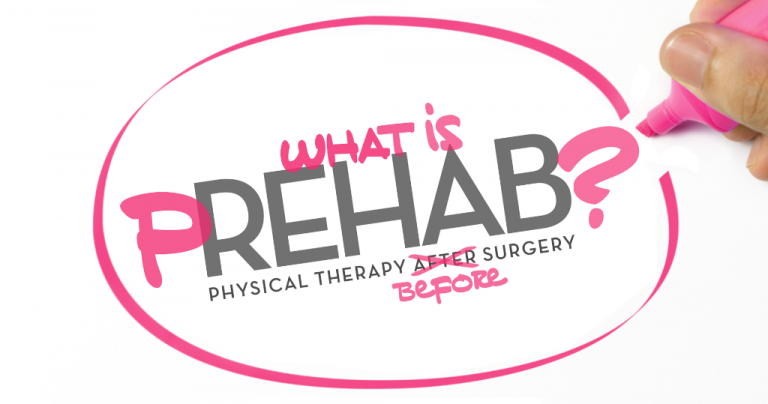
What is Prehab?
By Amanda Perry, PT, DPT and Brittany Marshall, SPT
Attending physical therapy for rehab BEFORE your elective surgery (ie “Prehab”) can accelerate your post-operative recovery. Your physical therapist can address deficits in your range of motion, flexibility, strength, and balance. We can also assist with pain management while you are waiting to undergo your surgical procedure. Research shows that patients who attend physical therapy prior to their surgery have better outcomes.
What is it?
Prehab is participation in therapy based movements and exercises in order to avoid injury, decrease pain or to prepare for a surgery. It is known as a proactive approach and can address deficits in strength, stability, range of motion, balance and overall joint function. It is common prior to a surgery or procedure in order to enhance recovery. It can be used as a preventative mechanism to decrease the risk of injury and/or to optimize your functional ability and quality of life. Prehab can include exercises for general strength/conditioning, sports performance or overall prevention of injury. It is generally recommended to engage in prehab approximately 2 months prior to a surgery. This allows your body enough time to have strength gains to best prepare you for your surgery. You should discuss preparation and a timeline for your procedure with your surgeon so that you know when it would be best to begin Prehab.
Should I do prehab before I have a joint replacement?
Engaging in exercises prior to a joint replacement prepares the body for an extensive surgery and can assist in decreasing recovery times. For example, if you participated in exercises prior to a knee replacement, you will go into the surgery stronger and are less likely to be as significantly weak after. Prehab provides the opportunity for you as a patient to have a role in controlling your recovery. By setting yourself up for success prior to surgery, you are less likely to struggle in the recovery process after surgery.
What about prehab for other surgeries?
Many patients who attend PT for shoulder pain or back pain prior to surgical interventions also have positive reports. For example, if we can maximize your shoulder range of motion and strength, without exacerbating your pain, prior to surgery, we will already be at a better starting point when we start exercises post-operatively. Sometimes patients improve so much, they decide that they do not need surgery!
What are the benefits of prehab?
Getting your mind and body ready for what it will be like after your surgery is a major benefit of prehab. This provides the opportunity to engage in exercises that are going to be addressed again after the surgery and are done prior to building the strength and ability of the muscles for the best outcomes possible. Research has shown that prehab prior to a total knee or hip replacement, of which is the most common joint replacement surgeries, significantly improves functional outcomes and strength of the muscles. Prehab has also been shown to increase the odds of being discharged from the hospital straight to home (as opposed to a rehabilitation facility) by 73% after a hip or knee replacement! Your physical therapist can teach you how to use a walker, what joint precautions you may need to adhere to after surgery and help you prepare your home for discharge. After your surgery, you will be walking at least 24 hours after, if not before. It is important to prepare yourself to get back on your feet as soon as possible and feel confident and safe doing so.
While not every patient is a candidate for “prehab,” I would encourage patients to ask their doctor and their physical therapist if this is right for you. Everyone wants to get back to their normal activities as quickly as possible after surgery, and prehab can be a great head start!
The medical information contained herein is provided as an information resource only, and does not substitute professional medical advice or consultation with healthcare professionals. This information is not intended to be patient education, does not create any patient-provider relationship, and should not be used as a substitute for professional diagnosis, treatment or medical advice. Please consult with your healthcare provider before making any healthcare decisions or for guidance about a specific medical condition. If you think you have a medical emergency, call your doctor or 911 immediately. IvyRehab Network, Inc. disclaims any and all responsibility, and shall have no liability, for any damages, loss, injury or liability whatsoever suffered as a result of your reliance on the information contained herein.